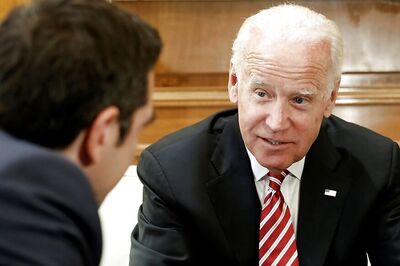
views
Senator Kamala Harris — whose campaign for the Democratic presidential nomination kicked off with a rally in Oakland on Martin Luther King Jr. Day attended by thousands, who impressed voters when she took on Joe Biden in the June debate — is dropping out of the race.
She made the announcement just days after my colleagues published an extensive report in which her staffers described the senator’s campaign as flailing financially and plagued by infighting.
“I’m not a billionaire. I can’t fund my own campaign. And as the campaign has gone on, it’s become harder and harder to raise the money we need to compete,” Harris wrote in a Medium post. “In good faith, I can’t tell you, my supporters and volunteers, that I have a path forward if I don’t believe I do.”
That first part, many observed, seemed to be a jab in part at the billionaires in the race like Tom Steyer, a fellow Californian who is funneling lots of his own money into his campaign.
As of Tuesday, Steyer was the only resident of the Golden State who is set to appear in this month’s presidential debate in California — at Loyola Marymount University in Los Angeles on December 19, to be precise.
Harris had already qualified for the debate. So far, she was the only person of color to do so in a field that has been touted as the most diverse ever. (Although, as The New York Times’ Jennifer Medina reported, the symbolism of barrier-breaking campaigns hasn’t been much of a propellant for candidates like Harris and Julián Castro, who would be the first Latino nominee.)
The timing of Harris’ announcement had to have been a bit awkward for Gov. Gavin Newsom, who, tweeted Monday afternoon that he was looking forward to joining his state’s junior senator “out on the trail.”
Going forward, his endorsement is up for grabs, as are those of other California leaders who had already thrown their support behind Harris, and those who haven’t yet endorsed.
As CalMatters reported, Harris was also raising money well in her home state.
On a press call about Sen. Bernie Sanders’ campaign efforts in California on Tuesday, Jeff Weaver, a senior adviser for the senator, said that it’s “no secret that Senator Harris had substantial support,” among elected officials in her home state. And Sanders’ campaign planned to reach out to those officials.
Still, Weaver said, “We’re going to play our own game.”
As for what’s next for our senator: Harris’ term extends until 2023. But as my New York Times colleague Adam Nagourney noted on Twitter, she’s now free to be tapped for vice president.
However, some readers said they look forward to Harris doing her current job.
“I hope she can focus on being our senator and not be off campaigning now to be vice president,” wrote Bob Gefvert, of Sonoma County.
Kathy Lollock, of Santa Rosa, wrote that she’s proud of her senator and glad she’ll be back: “She may not be ready for prime time in 2020, but she is a force to be reckoned with.”
In an opinion piece for The Times, author and historian Miriam Pawel made the case that, ultimately, Harris’ trajectory embodies many of the paradoxes and complexities embedded in California politics.
Jill Cowan c.2019 The New York Times Company




















Comments
0 comment